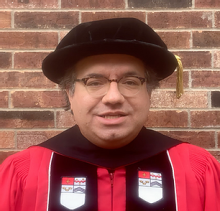
As the use and understanding of the wide range of generative AI tools becomes more pervasive, the ways in which educational institutions talk about and value these tools will continue to become clearer. Is the use of generative AI tools a 21st century skillset that students will need to master? In what way should we think of the university as a space in which students develop this skillset? In this session, we will be joined by a small panel of UT instructors, graduate students, and staff who will talk about their use of these tools in specific input/output formats.
Zoom link for the session: https://utexas.zoom.us/j/94641778976
Join our panel as we explore this emerging area:

Connor Philips: Connor Philips is a PhD student in Community & Regional Planning. With an educational background in public health and urban planning, Connor has studied tobacco cessation programs, micro-mobility and health, and most recently, artificial intelligence in urban infrastructure. As an NSF Resarch Traineeship fellow, Connor’s work will integrate ethics into AI research for smart cities; learn more about UT's Ethical A.I NSF project here. More specifically, Connor hopes to lead conversations around fairness, justice and safety in terms of the technological future of our urban environments. |

Julie Schell: Dr. Julie Schell is the Assistant Vice Provost of Academic Technology and the Director of the Office of Academic Technology at The University of Texas at Austin. She is also an Assistant Professor of Practice in the Departments of Design and Educational Leadership and Policy, where she teaches graduate and undergraduate studio-based courses. She focuses on the synergies that bridge design, pedagogy, and technology to create meaningful learning experiences. In her current studio, Dr. Schell and her students are partnering with generative AI to prototype speculative objects and environments designed to improve teaching and learning. She has over 25 years of experience in higher education and has held positions at the nation's top research universities, including Stanford, Columbia, Harvard, and Yale. She completed her doctorate in Higher and Postsecondary Education at Teachers College, Columbia University, and a four-year postdoctoral fellowship in the Mazur Group at Harvard University. |

Ken Fleischmann Dr. Kenneth R. Fleischmann is a professor in the School of Information at UT Austin. He is also the Founding Chair of Good Systems, a UT Grand Challenge, the Founding Director of Undergraduate Studies for the iSchool's B.A./B.S. in Informatics, and the Founding Editor-in-Chief of the ACM Journal on Responsible Computing. For over twenty years, his research and teaching have focused on the ethics of AI. His research has been funded by NSF, MITRE, IARPA, Microsoft Research, Cisco Research, Micron Foundation, and the Public Interest Technology University Network. His research has been recognized by iConference Best Paper awards in 2012, 2021, and 2022; the ASIS&T Best Information Behavior Conference Paper Award in 2012 and 2022; the ASIS&T SIG-SI Social Informatics Best Paper Award in 2018; the Civic Futures Award for Designing for the 100% in 2019; and the MetroLab Innovation of the Month Award in 2020 and 2021. In 2023, he received the Cale McDowell Award for Innovation in Undergraduate Studies from the Undergraduate College. Starting in Spring 2024, he will teach Ethics in AI, a required course in the new MSAI program. |

